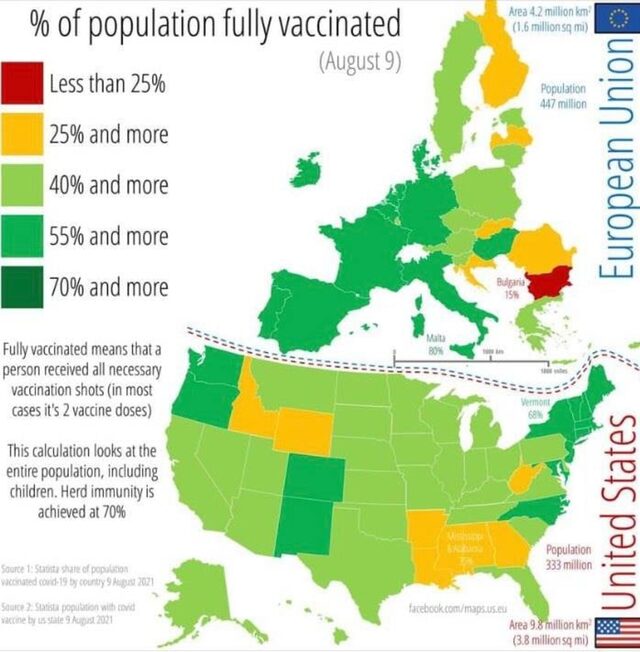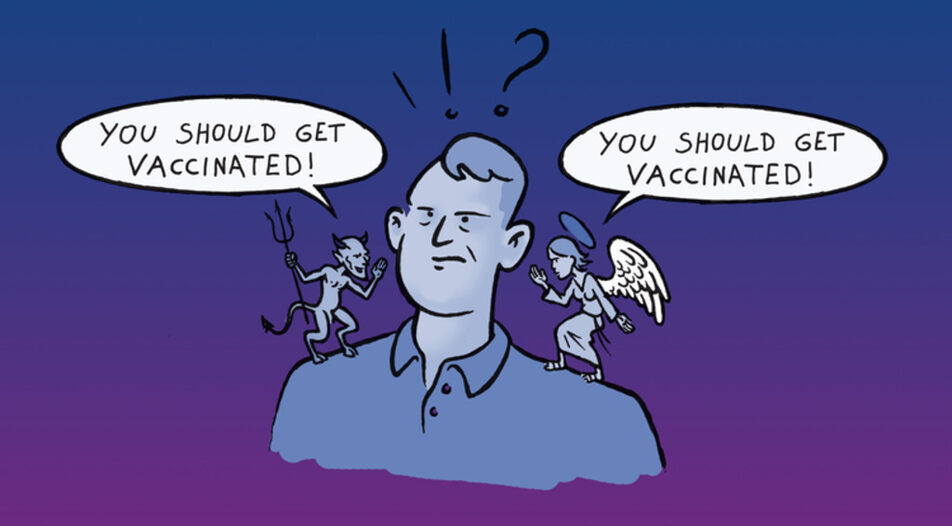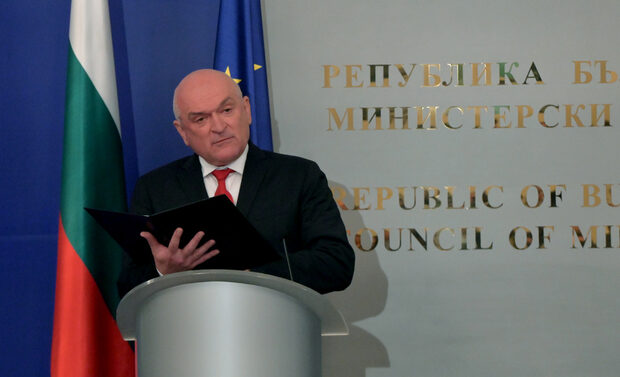Bulgaria is a laggard when it comes to vaccinations not only within the EU, but in the Western world as a whole. The situation is so bad that the Bulgarian Health Ministry shared last week a map of the percentage of individuals who got fully vaccinated around Europe and the USA (see below) over its official Facebook channel last week. Out of desperation, one must presume.
Yet this will probably not change the mind of die-hard conspiratologists: "Our nation is great! I salute Bulgarian doctors and teachers who refuse to bow before the New World Order," says one of the most liked comments in the thread below the post. Many similar comments of real, sane people agree with this user, despite the overwhelming scientific arguments in support of mass immunization and the obvious proof that the country is entering a new and potentially deadlier Covid wave.
How did it come to this?
Friedrich Naumann Foundation for Freedom (FNF) and the Association of European Journalists - Bulgaria tried to explain how Bulgarians became so mistrustful of the vaccines, and other phenomena related to the mass desinformation war that won over their hearts and minds during the pandemic. This produced a series of in-depth inquiries, which were collected under the title "Infodemics' Chronicles," part of the global #FreedomFightsFake campaign of FNF. In the coming weeks, Kapital Insight will run several of the stories that are most relevant to Bulgaria.
This is the first one.

On August 1, thousands of Germans who disagreed with the coronavirus measures imposed by their government flooded Berlin's streets in protest. At a time when cases were rising countrywide, the demonstrators - among whom were far-right members and anti-vaxxers - deemed the pandemic to be "the largest conspiracy theory" and proclaimed its end. Some of them carried signs opposing the COVID-19 vaccine, even though at that time a vaccine had yet to appear. The demonstration was held under the name "Day of Freedom", an eerie echo of one of the most popular propaganda movies made during the rise of the Third Reich. Although participants numbered far less than the 1,3 million claimed by the organizers, the logical question follows as to whether denying facts about vaccines and science is not poised to become the next form of collective delusion with unexpectedly harmful consequences for humanity.
The debate around vaccine safety is not a new one. At the end of the last century, an article by a gastroenterologist, Andrew Wakefield, speculated about a possible relationship between measles, mumps, and rubella (MMR) vaccine and autism in children, and it inspired the Anti-vaxx movement. Despite the subsequent rebuttal of the article and Wakefield's being struck off the medical register, calls for refusing vaccination continue to enjoy significant popularity worldwide.
The vaccine discussion has taken on a whole new meaning since it turned out that a vaccine offers a solution to the current pandemic. Strong resistance and the refusal of a significant part of the population to vaccinate might compromise the main goal, which is herd immunity. A possible COVID-19 vaccine would eliminate the threat only if the majority of the population is vaccinated. This way, those who cannot get vaccinated for medical or other valid reasons could also be protected.
In Bulgaria, vaccine disinformation is spreading mainly on social media, particularly on Facebook, where anti-vaxxer groups have existed for years. Some news websites also circulate these claims, but they are mostly marginal sources such as Skandalno.net, Pogled.info, and Otizvora.com, which do not rely on readership but on platform engagement on Facebook. Vaccine disinformation reaches a large swath of Bulgarians on social media, undermining one of the most reliable strategies to end the current crisis.
From near and far
One of the first articles about a potential vaccine for the new virus dates from January 21st, when the start of vaccine development was announced by the media. Although at that time there was information that scientists from several countries were looking for a cure for the new disease, there were only three publications in Bulgaria on the research conducted in the United States. Another 30 articles informed readers that Russia was working on a vaccine, immediately after the first recorded case in that country. Prior to this time, we find only publications by Regional Health Inspectorates (RHI) recommending vaccination with the flu shot if visiting China, which was considered to have "an explosion of pneumonia cases".
Rumours that large pharmaceutical companies sought to profit from a COVID-19 vaccine appeared on social media around mid-February. At the time, such claims were sporadic and unpopular. Officially, there was no coronavirus in Bulgaria, and therefore no reason to worry.
This changed in March when the country's first cases were recorded. This became the main subject of attention, forcing all else aside. According to data by the media analysis company Perseptica, every day the media churns out over ten thousand articles on the coronavirus, and there were over 4,500 articles dedicated to the COVID-19 vaccine published in March alone.
Websites specializing in spreading conspiracy theories apparently needed more time to target the future COVID-19 vaccine. One of the first pieces on the topic appears in the second half of March, when Pogled.info published an article translated from Russian. It claimed that a potential vaccine might be a part of a global plot to destroy humanity.
More reasonable-sounding, dangerous examples of disinformation can be found on Facebook. They spread quickly across the network of anti-vaccine groups and pseudo-news consumers, reaching the Bulgarian public almost immediately. This is the case with the claim that the campaign for mass vaccinations against COVID-19 led to the death of seven children in Senegal. The story spread with lightning speed, accompanied - for more credibility - by a video of a local woman who talks about the issue in English.
As it turns out, at the source of this campaign is a piece of information in a rare language, one of the most popular disinformation techniques. In this case, the original video is in Wolof, one of the spoken languages in Senegal, and the video makes no mention of dead children. This technique relies on the fact that it would be extremely difficult to verify the claims and users have to take the information at face value. Despite the story having been debunked a few weeks after it had appeared on social media, and posts containing the story flagged as false information since, in Bulgaria it is used as a proof to popularize some of the most extreme theories on the subject: that vaccines contain nanotechnologies to control and monitor the population.
Not only was there no vaccine at that time, but one was not expected in the foreseeable future. But this and similar pieces antagonize people against a future vaccine. This becomes particularly clear in reactions within Facebook groups upon publications from objective sources about vaccine development. After weeks of disinformation exposure, users are not greeting the idea of a vaccine with a rousing welcome.
At the end of April, it was difficult to find widespread distrust of COVID-19 vaccines. This quickly changed when anti-vaxxers managed to find the right formula to reach users on social media: professionally-shot video content.
From the peak to the plateau
Vaccine disinformation peaked in mid-May, with the emergence of extremely popular videos warning against the dangers of the not-yet-existing COVID-19 vaccine. Among these was, of course, a clip featuring Judy Mikovits claiming that the new coronavirus vaccine will "kill millions". These allegations spread quickly around the world though in Bulgaria, they have been debunked and the video removed from social media. This does not prevent people from still believing it and sharing similar pieces from various sources.
Such information originates from American or Russian sources and it quickly spreads around different countries through local groups who translate it into their respective languages and share it.
It can be said that between May and August we hit a plateau, where newer and newer clips on the subjects flooded social media. The web of adversaries of the future vaccine had not grown much during that period, but their determination to counter every attempt at immunization was being fuelled by constant waves of disinformation.
Like any other conspiracy theory, this one also needs an arch-villain against whom the people can unite. Someone capable of embodying the claims of an all-encompassing plan, preferably one to control humanity. In this case, Bill Gates looks like the best-fitting candidate. He is not only extremely rich and powerful, but also has a clear position on a number of social issues, and especially those concerning vaccines.
Conspiracy-lovers resort to manipulation and doctored videos of Gates's various statements. Only a small step separates this from the theory that Gates had caused the pandemic on purpose in order to make a profit from the vaccines.
How many people does the disinformation reach after all?
The very way in which disinformation on the subject is disseminated - not through media, but via Facebook posts and clips, often shared inside closed or hidden groups, makes it exceedingly difficult to evaluate the size of the phenomenon. The largest group, called Vaccines and prevention - an informed choice, has 36,700 members.
The number of views on shared clips gives us a much better idea of the size of the 'infordemic'. The hits reveal a serious situation, as they range from 52,000, 147,000, and even 358,000 for a video of a German doctor refusing to vaccinate against COVID-19. Even though watching a video cannot be equated to support of its claims, the fact that the content reached so many people raises concern in and of itself.
A solution beyond confrontation
What can be done to limit the influence of the disinformation campaign against a future vaccine?The good news is that mainstream media remains to some extent an anti-vaccine-rhetoric free zone, despite its other opinions and biases. The bad news is that the ball is not in their court since disinformation comes from marginal websites and social media.
During the summer, the constant pushing of various prognoses of when a vaccine will be ready also undermined public trust. The very experts quoted most by the media could not give a clear response when questioned about this. According to various assessments at the time, a vaccine was supposed to arrive in March, June, July, September, the end of 2020, mid-2021, or in two years at best. After reading about ten such pieces in the scope of a month, a sense of confusion and bewilderment as to what is going on is understandable.
And yet disinformation spreads mainly thanks to social media, which can hardly be forced to act on this subject. This is especially true of Facebook. Although thе platform is making efforts to flag and limit untrue information on this topic for its English-speaking users, this becomes a much more difficult task when unpopular languages like Bulgarian are involved. Not just Bulgaria, but the larger part of the Balkans are absent from the world map of Facebook's fact-checking partners who find and flag disinformation.
This means that it is rare to encounter a post or comment in Bulgarian which has been flagged for disinformation. It is no surprise that Judy Mikovits's videos in English were taken down long ago, yet continue to exist in Bulgarian, and even new clips featuring her are uploaded. The same applies to other conspiracy theorists worldwide, whose posts and clips in English are accompanied by a disinformation warnings but clips with Bulgarian subtitles have nothing of the sort.
The spread of disinformation is happening primarily in closed or hidden groups, where members share a common stance against vaccines and every claim enjoys almost unanimous support. These echo-chambers help build extremely tight-knit groups with uniform thinking whose opinion can hardly be changed.
One of the goals of disinformation campaigns is precisely division - there must be extreme polarization and no common ground. Mocking anti-vaxxers actually contributes to this. The lack of dialogue and common ground means that even articles and analyses supported by evidence and data do not reach the audience who needs them the most.
In an interview published in 1995, Bill Gates stated that he expected information online to reach users according to its level of credibility and how well-sourced it is. Obviously, his expectations did not turn out to be true. This is another proof that Gates himself is not an omnipotent overlord who can determine the direction of history. After all, he did not predict how the online debate would look like, yet alone that in 2020 he would have to officially deny his involvement in a global pandemic.
Gate's interviewer - none other than the world-famous writer Terry Pratchett - was much closer in his predictions. According to him, it would be hard for users to verify the online content they're consuming, giving even the most incredible story citing an anonymous or dubious source equal claim to credibility as a real scientific article published by a respected journal.
This inability to curate content according to its reliability has become one of the vulnerabilities of social networks, and of the Internet as a whole. As Terry Pratchett said: "A lie can run round the world before the truth has got its boots on." False information manages to sow discord even during unprecedented challenges which require a global response, such as the current pandemic. And distrust in science is likely to come at a high price, which will not be paid by conspiracy theory buffs but by society as a whole.
Perhaps this very insecurity and the lack of a cure or solutions are forcing us to blindly cling to anything available instead of listening to medical experience.
About the author: Petar Galev is a media analyst with years of experience studying social and traditional media. As a member of media analysis company Pesectica's team, he conducts a series of reports investigating the media implications of important social and political trends.
Note: This article is based on research done between March and August 2020.
Bulgaria is a laggard when it comes to vaccinations not only within the EU, but in the Western world as a whole. The situation is so bad that the Bulgarian Health Ministry shared last week a map of the percentage of individuals who got fully vaccinated around Europe and the USA (see below) over its official Facebook channel last week. Out of desperation, one must presume.
Yet this will probably not change the mind of die-hard conspiratologists: "Our nation is great! I salute Bulgarian doctors and teachers who refuse to bow before the New World Order," says one of the most liked comments in the thread below the post. Many similar comments of real, sane people agree with this user, despite the overwhelming scientific arguments in support of mass immunization and the obvious proof that the country is entering a new and potentially deadlier Covid wave.












